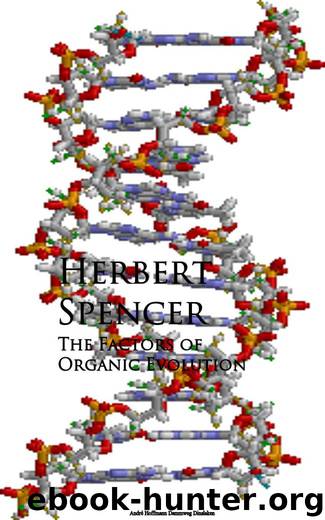The Factors of Organic Evolution by Herbert Spencer

Author:Herbert Spencer [Spencer, Herbert]
Language: eng
Format: epub
Published: 2016-09-04T22:00:00+00:00
The growth of a thing is effected by the joint operation of certain forces on certain materials; and when it dwindles, there is either a lack of some materials, or the forces co-operate in a way different from that which produces growth. If a structure has varied, the implication is that the processes which built it up were made unlike the parallel processes in other cases, by the greater or less amount of some one or more of the matters or actions concerned. Where there is unusual fertility, the play of vital activities is thereby shown to have deviated from the ordinary play of vital activities; and conversely, if there is infertility. If the germs, or ova, or seed, or offspring partially developed, survive more or survive less, it is either because their molar or molecular structures are unlike the average ones, or because they are affected in unlike ways by surrounding agencies. When life is prolonged, the fact implies that the combination of actions, visible and invisible, constituting life, retains its equilibrium longer than usual in presence of environing forces which tend to destroy its equilibrium. That is to say, growth, variation, survival, death, if they are to be reduced to the forms in which physical science can recognize them, must be expressed as effects of agencies definitely conceived—mechanical forces, light, heat, chemical affinity, &c.
This general conclusion brings with it the thought that the phrases employed in discussing organic evolution, though convenient and indeed needful, are liable to mislead us by veiling the actual agencies. That which really goes on in every organism is the working together of component parts in ways conducing to the continuance of their combined actions, in presence of things and actions outside; some of which tend to subserve, and others to destroy, the combination. The matters and forces in these two groups, are the sole causes properly so called. The words “natural selection,” do not express a cause in the physical sense. They express a mode of co-operation among causes—or rather, to speak strictly, they express an effect of this mode of co-operation. The idea they convey seems perfectly intelligible. Natural selection having been compared with artificial selection, and the analogy pointed out, there apparently remains no indefiniteness: the inconvenience being, however, that the definiteness is of a wrong kind. The tacitly implied Nature which selects, is not an embodied agency analogous to the man who selects artificially; and the selection is not the picking out of an individual fixed on, but the overthrowing of many individuals by agencies which one successfully resists, and hence continues to live and multiply. Mr. Darwin was conscious of these misleading implications. In the introduction to his Animals and Plants under Domestication (p. 6) he says:—
“For brevity sake I sometimes speak of natural selection as an intelligent power; ... I have, also, often personified the word Nature; for I have found it difficult to avoid this ambiguity; but I mean by nature only the aggregate action and product of many natural laws,—and by laws only the ascertained sequence of events.
Download
This site does not store any files on its server. We only index and link to content provided by other sites. Please contact the content providers to delete copyright contents if any and email us, we'll remove relevant links or contents immediately.
Fanny Burney by Claire Harman(26605)
Empire of the Sikhs by Patwant Singh(23089)
Out of India by Michael Foss(16856)
Leonardo da Vinci by Walter Isaacson(13339)
Small Great Things by Jodi Picoult(7148)
The Six Wives Of Henry VIII (WOMEN IN HISTORY) by Fraser Antonia(5518)
The Wind in My Hair by Masih Alinejad(5097)
A Higher Loyalty: Truth, Lies, and Leadership by James Comey(4965)
The Crown by Robert Lacey(4818)
The Lonely City by Olivia Laing(4804)
Millionaire: The Philanderer, Gambler, and Duelist Who Invented Modern Finance by Janet Gleeson(4481)
The Iron Duke by The Iron Duke(4362)
Papillon (English) by Henri Charrière(4277)
Sticky Fingers by Joe Hagan(4204)
Joan of Arc by Mary Gordon(4116)
Alive: The Story of the Andes Survivors by Piers Paul Read(4035)
Stalin by Stephen Kotkin(3970)
Aleister Crowley: The Biography by Tobias Churton(3642)
Ants Among Elephants by Sujatha Gidla(3468)
